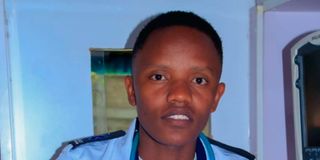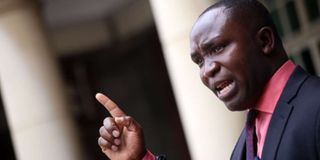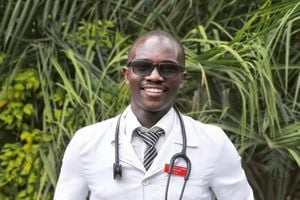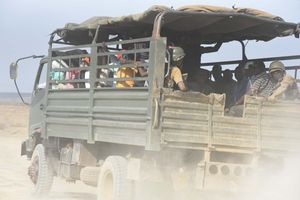Medics under siege: Alarming rise of violence against health workers

Martin Muiruri, a nurse who experienced violence while working as an emergency medical technician.
What you need to know:
- In early December, nurses at Machakos Level 5 Hospital downed their tools in protest over increased assault cases by patients and their companions. In this case, a patient had reportedly beaten up and critically injured a professional attending to him.
- In the same month, a relative of a patient at Naivasha Level 4 Hospital brandished a gun at health workers in resistance to the treatment that was being offered to the patient.
They are often yelled at, intimidated, spat on, threatened and even beaten up by families or patients they are trying to save. This has become a new reality in the once-revered halls of medicine.
In a video that went viral just over a week ago, a nurse on duty at Port Victoria Hospital, Busia County, was being harassed by two disgruntled individuals.
They threatened to call a particular politician on her if she didn’t yield to their demands of treating their patient.

Kenya Union of Clinical Officers Secretary-General George Gibore.
According to George Gibore, secretary-general at the Kenya Union of Clinical Officers, such cases have become distressingly common.
“It is not the first incident in the last couple of months. When you have one case like the one at Port Victoria being on the public radar, many of such nature go unreported, leaving medical professionals suffering in silence,” he says.
In early December, nurses at Machakos Level 5 Hospital downed their tools in protest over increased assault cases by patients and their companions. In this case, a patient had reportedly beaten up and critically injured a professional attending to him.
In the same month, a relative of a patient at Naivasha Level 4 Hospital brandished a gun at health workers in resistance to the treatment that was being offered to the patient.

Martin Muiruri, a nurse who experienced violence while working as an emergency medical technician, during the interview.
In many ways, Gibore says, the violence happening in the hospitals is stark evidence of a frayed healthcare system, one on a tipping point.
“There are many health facilities that are not operating optimally because of issues such as perennial understaffing, inadequate equipment and resources and family strain because health workers are overwhelmed and burnt out. Yet, even in situations where they are giving their best or refer patients to other facilities, they are described as being negligent," Gibore says.
"We have had many situations where some patients cause fracas because they want preferential treatment or a situation whereby, due to understaffing, a health worker is dealing with multiple critical cases. If a rather stable patient came in demanding treatment and is asked to patiently wait, it can rupture into frustration and anger,” he adds.
The Kenya Medical Practitioners and Dentists Council CEO David Kariuki tells Healthy Nation that such events are treated as an assault on healthcare workers.
He, however, says most of the complaints may not reach the council because the parties involved most likely settle the matter at the county level.
“If the clients are remorseful, health workers are generally compassionate and they can forgive them,” he says.
Dr Kariuki says that despite clients (patients) having their rights, there are also limits within which the rights can be exercised.
“There are no rights without limits. If they have a right to be seen, then they also have the responsibility to follow instructions. Part of the patient’s responsibility is to have courtesy to the people providing services to them so that they can get quality care,” he says.
Inquiring about the process of reporting such cases, Dr Davji Atella, secretary-general of the Kenya Medical Practitioners and Dentists Union, explains that in a hospital, it is the medical superintendent who is usually in charge.
“It is important for the doctor to report such a case to the head of department. We do not have a clear guideline on reporting assault now,” he says.
He says there needs to be security provisions within the hospitals so that it will be much easier to report such cases and have actions taken against the perpetrators.
“It is now important that the government gets a mechanism to provide protection not only at the public facilities but also the private ones so that it can be devoid of interference of political leaders,” he says.
Partly, Gibore faults the government for being “slow” in addressing these cases despite reports showing that they are on the rise.
According to the World Health Organization (WHO), between 8-38 per cent of health workers suffer at least one form of violence. Who defines it as any form of work-related abuse, threats or assaults including physical, sexual, verbal and psychological abuse and workplace harassment.
“In many health facilities, there are no surveillance cameras or security personnel who can raise the alarm if such an unfortunate incident occurs. The government should take action on that. Further, the reporting system should be clear enough for affected health workers,” says Gibore.
Here are testimonies of healthcare professionals who have experienced violence in the line of duty.
John Kariuki — Clinical officer at Naivasha Level 4 Hospital
“I arrived at work in the morning and found a patient who had been brought in by well-wishers in an unconscious state.
He was handed over to us by our colleagues, who had been on the night shift. We managed his condition as we waited for his relatives to show up, and they did, eight hours later. It was the dad and his uncle who came to the hospital.
My colleague and I told the family that the boy needed a CT scan. Since we don’t have such services in our hospital, we usually ask the patients to seek the services at a nearby facility.
We also told the family that the patient needed to be at the Intensive Care Unit and I even went ahead and organised for a bed. The relatives left, saying they did not have money, but we still managed the patient waiting for their decision.
They took about an hour before giving us feedback on their decision. By the time they were coming back, my colleague and I were attending to another patient who had been brought in with head injury.
In the process, we noticed that the other patient who was already on oxygen and drips for medication, was desaturating –the oxygen level in his body was going down.
We quickly went to take care of this patient because his condition was more risky.
The first thing we tried to do was to resuscitate him. In the process of resuscitation, a gentleman whom I learned later was the uncle of the patient walked in. He drew a gun and told us that should the patient die, we would also die.
He then went to stand outside the Accident and Emergency Unit. That shook us for a minute, but we continued offering the cardiopulmonary resuscitation.
We decided to call one of the doctors who had managed the patient the previous night and when she came, we tried to resuscitate the patient but he unfortunately died.
I went to the patient’s uncle, who was still standing at the Accident and Emergency Unit. We were all traumatised because we didn’t know if the man would shoot us if we told him that his kin had died.
The medical officer broke the news to him. The guy came in, tagging along with another relative. Since he had previously found me handling the deceased, he told his other relative that I was the one who killed his nephew.
He immediately became rowdy. He beat up the nurse first and then the security guards and some of the support staff who were there. When he was about to slap me, I dodged and that slap hit someone else. He then called his goons who stormed into the hospital and instructed them to attack me.
I managed to hide in the tea room and then locked the door using a bed. They tried to break the door for about 45 minutes. By the grace of God, it didn’t open. One of the board members came to try and rescue me, but they followed her as well.
We struggled for about an hour and 15 minutes but they didn’t manage. The goons had crude weapons so I always imagine what could have happened had they managed to get me. Police came to my rescue after some time.
Since that day, I can’t sleep without using sleeping pills. I have nightmares and the image of that day keeps ringing in my head. When I was in the tea room, the nurse was also hiding in one of the injection rooms.
It was the police officers who managed to whisk me away. The guy did not give up, he went ahead and published a story in one of the local dailies alleging that I had killed his nephew.
It was such a devastating moment for me. When I saw my photo in the newspaper, I contemplated suicide. It is my Bishop who rescued me. He saw my Whatsapp status which read; ‘sometimes there is peace in death’.
He immediately called me, asking me where I was, and came to take me to hospital. My colleague, the nurse, decided to quit and even wrote a resignation letter.
One of the nurses who is a counsellor supported us all through. The clinical officers’ union and some people from the county government came to talk to us and promised to transfer us to a different department. I recorded my case at the police station but I have never been called back.
I feel helpless and still traumatised. Later, when the post-mortem was done, it revealed that the patient was lucky to have stayed alive for eight hours. The results showed that the patient had had about eight cardiac arrests even before coming to the hospital. The patient was already brain-dead.
This is not the only incident, we have a number that happens on our watch but no one rarely talks about it. When I saw what happened at the Port Victoria hospital, I was broken, and the wound became fresh again.”
Martin Muiruri — Homecare nurse
“When I enrolled in a nursing course, I pondered whether the years of rigorous training would pay off. I was acutely aware that the journey would demand countless hours of sacrifice, possibly leading to time away from my family. However, amidst all these considerations, my safety was never a concern.
Who would want to harm a medic? Especially, in my field as a trauma responder? I had already responded to three trauma calls before the call which changed my perception. I had lost one patient, and I was healing from that.
When a patient you are handling dies, you are not only crushed by the failure but also the face of that experience. Such situations stalk us, and many medical professionals have sunk into depression as a result.
The nature of the trauma involved a saloon car that had two occupants; a driver and his co-driver, who had sustained the most injuries and was on the verge of crushing down while the driver’s vitals remained stable.
Contrary to common belief about emergency responders, our protocol is not to hastily transport patients to the hospital, but to first assess and stabilise them before any movement, especially in areas where stabilisation is impossible during transit. All this is done in what we call the golden hour.
As we started to stabilise the most affected patient, the other one started complaining that we were taking too long to start moving.
The driver, seemingly impatient and oblivious to the gravity of the situation, berated us for taking too long. Attempts to explain our process fell on deaf ears and the tension escalated when he hurled a sanitiser bottle in my direction. I was able to duck it, but the incident did not end there.
In a fit of rage, he began pulling at the IV line connected to the other patient, insisting that he would personally transport him to the hospital.
Bystanders intervened, eventually restraining him until another ambulance arrived. Upon reaching the hospital and completing the handover, I encountered the co-driver, and from his facial expressions, I could tell that he was still angry at me.
At that moment, I was almost breaking down, and had it escalated, I don’t think I would be able to go back into the profession.
After that incident, I started getting panic attacks such that interactions with other patients’ families and friends would trigger a relapse, transporting me back to that fateful night. Over time, I got over it through counselling and talking to other medics.
If I could have lost him on that day, it wouldn’t have mattered that the relative delayed it; I am afraid that I would have been described as negligent. I didn’t escalate the issue beyond my then-employer, but this experience fostered my transition to homecare nursing.”






